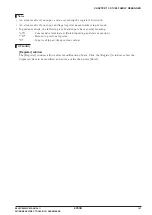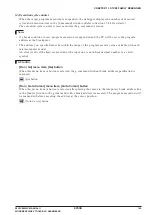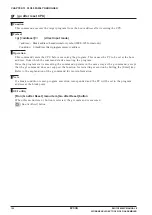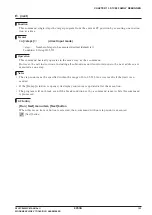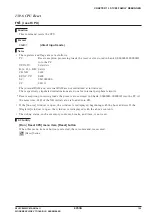
CHAPTER 13 S1C88 FAMILY DEBUGGER
140
EPSON
S5U1C88000C MANUAL II
WORKBENCH/DEV TOOLS/OLD ASSEMBLER
de
(data enter)
Function
This command rewrites the contents of the memory with the input hexadecimal data. Data can be
written to continuous memory locations beginning with a specified address.
Format
(1) >de <address> <data1> [<data2> [...<data16>]]
↵
(direct input mode)
(2) >de
↵
(guidance mode)
Data enter address ? : <address>
↵
Address
Original data : <data>
↵
..........
>
<address>:
Start address from which to write data; hexadecimal or symbol (IEEE-695 format only)
<data(1–16)>: Write data; hexadecimal
Condition:
0
≤
address
≤
0xffffff, 0
≤
data
≤
0xff
Examples
Format (1)
>de ff10 0
↵
... Rewrites data at address 0x0xff10 with 0.
Format (2)
>de
↵
Data enter address ? :ff10
↵
... Address is input.
00FF10 0 : a
↵
... Data is input.
00FF11 0 :
↵
... Skipped.
00FF12 0 : q
↵
... Command is terminated.
>
Notes
• The start address specified here must be within the range of the memory area available with each
microcomputer model.
An error results if the limit is exceeded or the input one is not a hexadecimal number or a valid
symbol.
• The contents of the unused area will be marked as "
∗
". If you encounter any address marked by "
∗
",
press [Enter] key to skip that address or terminate the command.
• Data must be input using a hexadecimal number in the range of 8 bits (0–0xff). An error results if the
limit is exceeded.
• When the contents of the data memory is modified using the de command, the displayed contents of
the [Dump] window are updated automatically.
• In guidance mode, the following keyboard inputs have special meaning:
"q
↵
"
… Command is terminated. (finish inputting and start execution)
"^
↵
"
… Return to previous address.
"
↵
"
… Input is skipped. (keep current value)
If the maximum address of data memory is reached and gets a valid input other than "^
↵
", the
command is terminated.






















